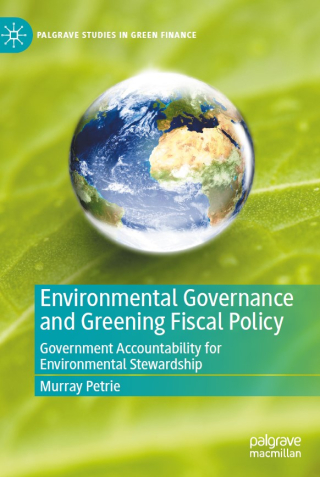
Posted by Murray Petrie and Richard Allen[1]
In a new book, ‘Environmental Governance and Greening Fiscal Policy’, published recently by Palgrave Macmillan, Murray Petrie addresses the increasingly urgent question: ‘How can governments be held more accountable for environmental stewardship?’
The book explores several topics:
- Enhanced national State of the Environment reporting and the integration of environmental outcomes in key national strategies and indicators.
- Mainstreaming environmental goals, targets, and risks by integrating them in fiscal policy decisions and the annual budget.
- Progressively exposing and eliminating harmful tax and expenditures policies.
- Putting a price on pollution.
- Providing environmental public goods.
PFM Blog Co-Editor Richard Allen interviews Petrie on his book and probes what is distinctive about environmental issues for fiscal policy and budget management.
RA: What motivated you to write this book?
MP: Mounting alarm over the twin existential threats of climate change and biodiversity loss, together with a growing awareness of the increasingly important impacts of fiscal policies on the environment - both environmentally harmful and beneficial impacts. In addition, recognition that environmental degradation has growing fiscal impacts and poses escalating fiscal risks.
RA: What do you see as the main areas of interaction between fiscal policies and the environment?
MP: A comprehensive view needs to be taken of the environment, and of fiscal policies. For example, Member States of the EU and the EU itself are required to start reporting against a detailed taxonomy of sustainable environmental outcomes from December 2021. France has gone further and classified all expenditures and tax expenditures in its 2021 government budget according to whether they have a favourable, mixed, or unfavourable environmental impact using the EU taxonomy.
RA: Why is fiscal policy so crucial to environmental sustainability? Surely environmental regulation is also extremely important?
MP: Absolutely. But there is no annual regulatory policy cycle or process that could integrate and mainstream environmental goals into government strategy and policy implementation. The government’s annual budget cycle is widely recognized as its most important policy statement and its most powerful policy integration and mainstreaming instrument. Green taxes and public spending are powerful tools of environmental policy, while other tools are hybrids of fiscal and regulatory interventions e.g., emissions trading schemes. Government policy increasingly needs to consider complex smart packages of regulatory and fiscal interventions – for example, with respect to carbon pricing and the use of other economic instruments such as congestion charging.
RA: Why not focus on the elements of fiscal policy that are most important in terms of environmental impact, e.g., capital infrastructure and maintenance projects and green taxes rather than creating a whole new framework?
MP: I agree that some elements of fiscal policy are much more important than others and that this calls for a common-sense approach to implementing green policies. In the book I discuss entry points at some length for the progressive greening of fiscal policy. This involves incorporating environmental objectives, targets, analysis, and filters across the budget cycle, in tax policy, and in the public investment management cycle. For instance, with respect to green taxes, Nobel-laureate William Nordhaus describes them as ‘…the holy trinity of environmental policy: they pay for valuable public services, they meet our environmental objectives efficiently, and they are non-distortionary. Few policies can be endorsed with such enthusiasm.’
RA: You criticise government fiscal strategy statements for still being dominated by economic and fiscal objectives and data. Shouldn’t they be? After all, fiscal policy and budgets are mainly about economic management and stewardship of the public finances.
MP: Over the last few decades fiscal strategies have increasingly incorporated social policy goals and indicators alongside economic and fiscal goals. My argument is that, as key statements and instruments of government strategy, fiscal and budget policies also need to contain discussion of the main environmental indicators. This might incorporate the ‘dashboard approach’ to measuring social progress advocated by Stiglitz/Sen/Fitoussi and numerous others, a mix of core economic, social, and environmental indicators. What I am advocating represents a natural evolution of fiscal policy, budgeting, as well as budget speeches and fiscal strategy documents.
RA: But aren’t you in effect trying to elevate environmental goals above economic and social goals to which many governments and citizens attach the greatest priority?
MP: On the contrary, the aim is to ensure that environmental considerations are represented at the table when decisions are made – in a way that they manifestly are not now, at least not systematically. As I describe in the book, national environmental reporting has lagged economic and social data and reporting. The trade-offs between these three domains are largely unacknowledged and not debated. Environmental considerations need to be fully and transparently incorporated in government strategy, and in the criteria used in making decisions on fiscal policy and budget allocations.
RA: Wouldn’t such an approach require major investments in information and capacity?
MP: Yes, indeed. Rebalancing policies towards environmental sustainability will require significant public investment in environmental monitoring, reporting, policy analysis, modelling and forecasting, and evaluation to provide the required data, information, and analysis. This should be viewed in the same way that governments, central banks, and the private financial sector invested massively in information, new regulatory frameworks and modelling capacity following the Global Financial Crisis of 2008, to try and reduce systemic risks from the financial system.
RA: You seem to favor a “maximalist” approach to green fiscal policy, but many countries might prefer a more measured approach, which doesn’t overstretch the capacity of governments. What needs to be changed in existing institutions and instruments, and what doesn’t?
MP: I readily acknowledge that my approach is ambitious. But it is extremely important to have a clear idea of the complete conceptual framework, the set of ultimate elements and compilation details, and the transitional steps that will depend on a country’s circumstances and capacity. By analogy with PFM, the IMF’s accrual-based Government Finance Statistics Manual 2014 represented a fundamental departure from the previous cash-based standard. While only advanced countries can really hope at present to report on a full accrual basis and in many countries only the initial steps are feasible, it is important to understand all the elements to include, the methods of compiling data, and the roadmap for completing the implementation process. My framework for management of the interfaces between fiscal policy and the environment can be viewed in the same general light.
RA: Don’t fiscal frameworks also need to be adjusted to reflect the extent of countries’ political commitment to environmental reform, which varies hugely. How should trade-offs with other priorities, e.g., fighting terrorism, disease, and poverty, dealing with the COVID-19 pandemic be managed?
MP: I agree. My main argument is that governments truly pursuing the public interest across generations need to increase their commitment to environmental sustainability. My book is really about the institutional innovations that might enable governments to move down this road, if they have an interest in doing so, and providing levers for accountability institutions, markets, and civil society to encourage the required reforms.
Environmental Governance and Greening Fiscal Policy: Government Accountability for Environmental Stewardship - https://0-link-springer-com.library.svsu.edu/book/10.1007/978-3-030-83796-9#toc
[1] Murray Petrie is a member of the IMF’s Panel of Fiscal Experts and of the OECD Green Budgeting Experts Group; Richard Alen is the Co-Editor of the PFM Blog.
Note: The posts on the IMF PFM Blog should not be reported as representing the views of the IMF. The views expressed are those of the authors and do not necessarily represent those of the IMF or IMF policy.







